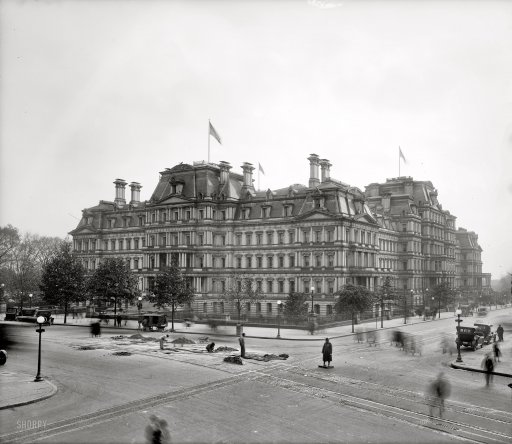
Harris&Ewing State, War & Navy Building, Washington DC 1917

“Our allocation model is now 100pc in cash. This is a warning signal for the market and it happens extremely rarely..”
• Economic Stress As World Runs Out Of Dollars (AEP)
Surging rates on dollar Libor contracts are rapidly tightening conditions across large parts of the global economy, incubating stress in the credit markets and ultimately threatening overvalued bourses. Three-month Libor rates – the benchmark cost of short-term borrowing for the international system – have tripled this year to 0.88pc as inflation worries mount. Fear that the US Federal Reserve may have to raise rates uncomfortably fast is leading to an acute dollar shortage, draining global liquidity. “The Libor rate is one of few instruments left that still moves freely and is priced by market forces. It is effectively telling us that that the Fed is already two hikes behind the curve,” said Steen Jakobsen from Saxo Bank. “This is highly significant and is our number one concern. Our allocation model is now 100pc in cash. This is a warning signal for the market and it happens extremely rarely,” he said.
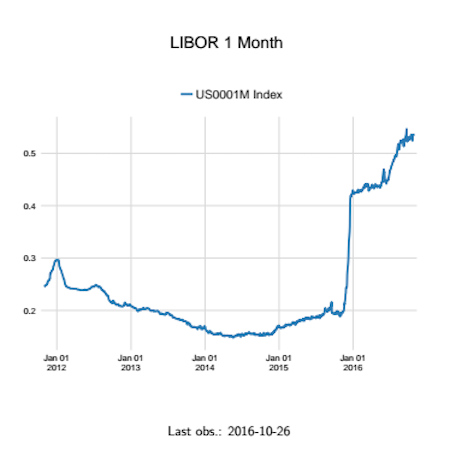
Goldman Sachs estimates that up to 30pc of all business loans in the US are priced off Libor contracts, as well as 20pc of mortgages and most student loans. It is the anchor for a host of exotic markets, used as a floor for 90pc of the $900bn pool of the leveraged loan market. It underpins the derivatives nexus. The chain reaction from the Libor spike is global. The BIS warns that the rising cost of borrowing in dollar markets is transmitted almost instantly through the global credit system. Changes in the short-term policy rate are promptly reflected in the cost of $5 trillion in US dollar bank loans,” it said. Roughly 60pc of the global economy is linked to the dollar through fixed currency pegs or “dirty floats”, but studies by the BIS suggest that borrowing costs in domestic currencies across Asia, Latin America, the Middle East, and Africa, move in sympathy with dollar costs, regardless of whether the exchange rate is fixed. Short-term “Shibor” rates in China have been ratcheting up.
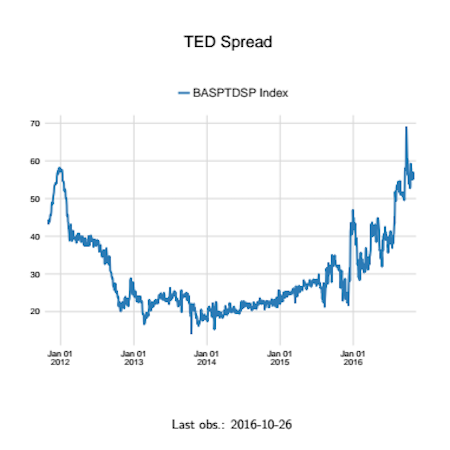
The cost of one-year swaps jumped to 2.71pc last week, and the spread over one-year sovereign debt is back to levels seen during the Shanghai stock market crash last year. This is not a pure import from the US. The Chinese authorities themselves are taking action to rein in a credit bubble. It is happening in parallel with Fed tightening, each reinforcing the other, and that makes it more potent. Three-month interbank rates in Saudi Arabia have soared to 2.4pc. This is the highest since the global financial crisis in early 2009 and implies a credit crunch in the Saudi banking system. The M1 money supply has fallen 9pc over the last year. The Bank of Japan has doubled its window of dollar credit for Japanese banks to head off an incipient dollar squeeze, drawing on the country’s ample foreign reserves.
It may not be so easy for others. Credit analysts are becoming nervous about the spread between Libor and the overnight index swap, the so-called Libor-OIS spread that is used to gauge problems in the plumbing of the credit system. It has widened to 38 basis points, near levels seen in the eurozone debt crisis and past bouts of stress. The message from the ‘TED spread’ is similar, if less severe. This measures the spread between eurodollar rates in London and three-month futures contracts for US treasuries. The picture is complex. These signals have been distorted by new rules for US prime money market funds, which have shrunk by $560bn and led to a contraction of commercial paper. The deadline for this reform has come and gone, yet the spreads have not settled.
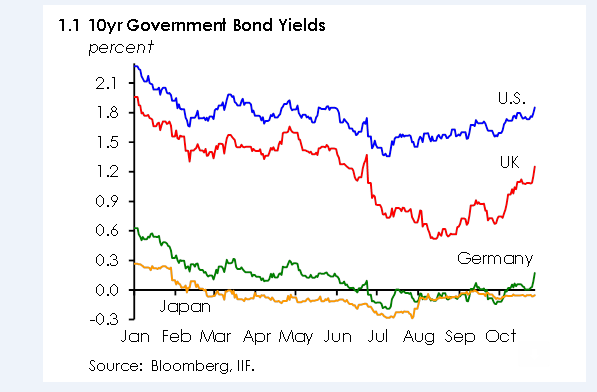

Only thing left to do now is find buyers.
• China as Factory to World Mulls the Unthinkable: Price Hikes (BBG)
China’s factories may be on the cusp of delivering a new shock to the global economy after years of undercutting rivals with cheaper costs. This time, increases in prices could reverberate around the world. To understand why, consider the dilemma facing Jiangmen Luck Tissue Mfy Ltd., now caught in a squeeze between surging wages and tepid demand. The company has already slashed staff by half, shaved prices and automated production to survive. Now, with margins razor thin, it’s weighing the first price increases since 2010. “There’s just no possibility for me to cut prices any more,” says deputy director Roger Zhao, 52, whose company is based in the city of Jiangmen in southern Guangdong province.
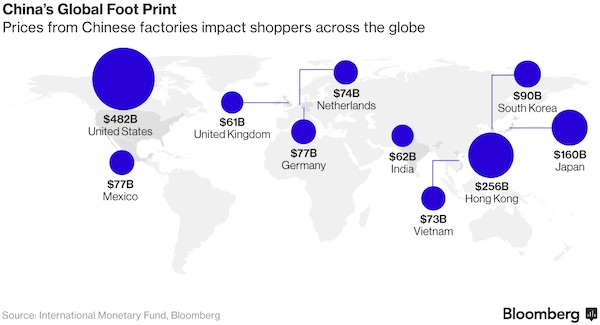
“Because costs are already pretty high and I don’t see any possibility they’ll go down, I’m seeking opportunities to raise prices a little bit.” That push to recover lost margins – even as demand remains muted – was shared by exporters of everything from clocks to jacuzzis interviewed in Guangzhou last week at the Canton Fair, a biannual gathering where 25,000 exhibitors and 180,000 mostly foreign buyers ink export deals in booths spanning exhibition space equivalent to about 3,400 tennis courts. For the world economy, decisions from companies like Jiangmen Tissue to stop cutting prices – and even raise them where demand allows – removes a source of disinflationary pressure.
To be decided is whether China, the factory to the world, swings from becoming a drag on consumer prices to a source of pressure nudging them higher. China’s manufacturing prices rose in September for the first time in almost five years and overall producer prices also clambered out of negative territory. Those likely to feel the biggest lift if Chinese export prices follow through with sustained increases would be the country’s top five markets: the U.S., Hong Kong, Japan, South Korea and Mexico. “China’s return to positive growth in producer prices marks a very significant turning point in deflationary pressures both in China and globally,” said Shane Oliver at AMP Capital Investors in Sydney. “This is only step one, though. We are still waiting for step two: stronger global demand and trade.”
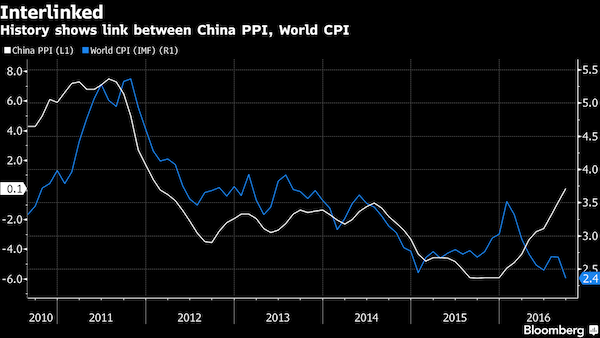

Draghi to the rescue. He better be fast.
• European Banks Stuck With $1.3 Trillion of Bad Loans, KPMG Says (BBG)
Eight years after Lehman Brothers’ collapse sparked the financial crisis, Europe’s banks still have €1.2 trillion ($1.3 trillion) of non-performing loans and will probably be stuck with them for decades to come, according to KPMG. Anemic economic growth across the region is making it harder for lenders to off-load toxic assets, hurting profitability while banks also come under pressure from tougher capital rules and fines for misconduct, London-based KPMG said in a report published Monday. Firms could take “decades rather than years” to reduce their exposures, hampering profitability. European lenders are battling to cut soured loans as they face evaporating income from lending amid negative interest rates from the ECB.
Net interest margins, the difference between income from lending versus cost of funding, average about 1.2% in the region compared with about 3% in the U.S., according to KPMG. “Reversing the profitability of European banks is not a lost cause but it will certainly be a lot of hard work,” Marcus Evans, a partner at KPMG’s ECB office, said in a statement. “It’s clear that across Europe banks are still grappling with the new world of low, or negative, interest rates and mounting capital and regulatory costs.” The total value of toxic loans in Europe has surged since 2008 from about 1.5% of lending to more than 5% since 2013, according to the report. This has a negative impact on profitability from unpaid interest, raising provisions against impaired assets and realizing losses when disposing bad debts, according to KPMG.

Lots of Weiner and Comey stuff today. Lots of guessing going on. Accurate picture is slow to seep through.
• FBI Obtains Warrant; Agents Waited Weeks To Tell Comey About Emails (WaPo) (WaPo)
FBI agents investigating Hillary Clinton’s use of a private email server while secretary of state knew early this month that messages recovered in a separate probe might be germane to their case, but they waited weeks before briefing the FBI director, according to people familiar with the case. Director James B. Comey has written that he was informed of the development Thursday, and he sent a letter to legislators the next day letting them know that he thought the team should take “appropriate investigative steps designed to allow investigators to review these emails.” That missive ignited a political firestorm less than two weeks before the election. Almost instantly, Comey came under intense criticism for his timing and for bucking the Justice Department’s guidance not to tell Congress about the development.
And his announcement means that Clinton could have to contend with the news that the FBI has resumed its investigation of her use of a private email server — without any clarity on whether its investigators will find anything significant — up to and beyond Election Day. The FBI has obtained a warrant to search the emails found on a computer used by former congressman Anthony Weiner that may contain evidence relevant to the investigation into Clinton’s private email server, according to law enforcement officials. The warrant was obtained in New York, as FBI agents there have possession of the laptop. [..].. officials familiar with the case said the messages include a significant amount of correspondence associated with Clinton and her top aide Huma Abedin, Weiner’s estranged wife.
People familiar with the case said that agents on the Clinton email team had known about the messages since soon after New York FBI agents seized a computer related to their investigation into Weiner [..] Officials said the agents probing Clinton’s private email server didn’t tell the director immediately because they were trying to better assess what they had. “It’s a step-by-step process,” said one senior law enforcement official. “There are many steps along the way that get you to a place where the director can be appropriately briefed in order to make a decision” about whether to move forward.

Even his wife was on to him. ‘They felt that he betrayed them and brought disgrace on the bureau by letting Hillary off with a slap on the wrist.’
• Why Comey Jumped At The Chance To Reopen Hillary Investigation (DM)
James Comey’s decision to revive the investigation of Hillary Clinton’s email server and her handling of classified material came after he could no longer resist mounting pressure by mutinous agents in the FBI, including some of his top deputies, according to a source close to the embattled FBI director. ‘The atmosphere at the FBI has been toxic ever since Jim announced last July that he wouldn’t recommend an indictment against Hillary,’ said the source, a close friend who has known Comey for nearly two decades, shares family outings with him, and accompanies him to Catholic mass every week. ‘Some people, including department heads, stopped talking to Jim, and even ignored his greetings when they passed him in the hall,’ said the source.
‘They felt that he betrayed them and brought disgrace on the bureau by letting Hillary off with a slap on the wrist.’ According to the source, Comey fretted over the problem for months and discussed it at great length with his wife, Patrice. He told his wife that he was depressed by the stack of resignation letters piling up on his desk from disaffected agents. The letters reminded him every day that morale in the FBI had hit rock bottom. ‘He’s been ignoring the resignation letters in the hope that he could find a way of remedying the situation,’ said the source. ‘When new emails that appeared to be related to Hillary’s personal email server turned up in a computer used by Huma Abedin and Anthony Weiner, Comey jumped at the excuse to reopen the investigation.
‘The people he trusts the most have been the angriest at him,’ the source continued. ‘And that includes his wife, Pat. She kept urging him to admit that he had been wrong when he refused to press charges against the former secretary of state. ‘He talks about the damage that he’s done to himself and the institution [of the FBI], and how he’s been shunned by the men and women who he admires and work for him. It’s taken a tremendous toll on him. ‘It shattered his ego. He looks like he’s aged 10 years in the past four months.’ But Comey’s decision to reopen the case was more than an effort to heal the wound he inflicted on the FBI. He was also worried that after the presidential election, Republicans in Congress would mount a probe of how he had granted Hillary political favoritism.

Maybe the agents should have spoken out earlier?
• FBI in Internal Feud Over Hillary Clinton Probe (WSJ)
The surprise disclosure that agents from the Federal Bureau of Investigation are taking a new look at Hillary Clinton’s email use lays bare, just days before the election, tensions inside the bureau and the Justice Department over how to investigate the Democratic presidential nominee. Investigators found 650,000 emails on a laptop that they believe was used by former Rep. Anthony Weiner and his estranged wife Huma Abedin, a close Clinton aide, and underlying metadata suggests thousands of those messages could have been sent to or from the private server that Mrs. Clinton used while she was secretary of state, according to people familiar with the matter.
It will take weeks, at a minimum, to determine whether those messages are work-related from the time Ms. Abedin served with Mrs. Clinton at the State Department; how many are duplicates of emails already reviewed by the FBI; and whether they include either classified information or important new evidence in the Clinton email probe. Officials had to await a court order to begin reviewing the emails—which they received over the weekend, according to a person familiar with the matter—because they were uncovered in an unrelated probe of Mr. Weiner.
The new investigative effort, disclosed by FBI Director James Comey on Friday, shows a bureau at times in sharp internal disagreement over matters related to the Clintons, and how to handle those matters fairly and carefully in the middle of a national election campaign. Even as the probe of Mrs. Clinton’s email use wound down in July, internal disagreements within the bureau and the Justice Department surrounding the Clintons’ family philanthropy heated up, according to people familiar with the matter.

“Accidentally removing a single classified message from controlled spaces, without any evidence of intent or exposure to hostile forces, can get you fired and cost you your clearance. Repeated instances will land you in prison.”
• Hillary’s Emails Matter: A Retired CIA Officer Explains Why (Hill)
Nobody uses a private email server for official business. Period. Full stop. The entire notion is, to borrow a phrase from a Clinton campaign official, “insane.” That anyone would presume to be allowed to do so is mind-boggling. That government officials allowed Hillary Clinton to do so is nauseating. Classified and unclassified information do not mix. They don’t travel in the same streams through the same pipes. They move in clearly well defined channels so that never the twain shall meet. Mixing them together is unheard of and a major criminal offense. If you end up with classified information in an unclassified channel, you have done something very wrong and very serious.
Accidentally removing a single classified message from controlled spaces, without any evidence of intent or exposure to hostile forces, can get you fired and cost you your clearance. Repeated instances will land you in prison. Every hostile intelligence agency on the planet targets senior American officials for collection. The Secretary of State tops the list. Almost anything the Secretary of State had to say about her official duties, her schedule, her mood, her plans for the weekend, would be prized information to adversaries. It is very difficult, in fact, to think of much of anything that the Secretary of State could be saying in email that we would want hostile forces to know. As we wait for more information on the latest revelations, let’s quickly note what we already know Hillary Clinton did.
While Secretary of State, Hillary Clinton exclusively used a private email address for official business. Instead of using a State Department account, she used a personal email account, housed on a private server located in her home in Chappaqua, New York. The Department of State exercised zero control or oversight in this process. No government security personnel were involved in protecting them. When the House Select Committee on Benghazi asked to see these emails, the Department of State said they did not have them. Clinton’s lawyers then went through all the emails on her server. They turned over 30,000 emails they decided were work related and deleted all of the rest. How they made the decision as to which emails to share and which to destroy remains unknown. Active government officials not were involved in this process.
Hillary says she did not use the account to transmit classified information. This has been proven false. The FBI found over 100 messages that contained information that was classified when sent, including numerous email chains at the level of Top Secret/Special Access Programs. They don’t get any more highly classified, it’s the virtual summit of Mt. Everest. [..] While serving in one of the most senior positions in the United States Government, Hillary Clinton was at a minimum, grossly negligent in the handling of classified information and when confronted with this practice, acted immediately to destroy information and prevent a full, fair and complete investigation of any damage to national security. Anyone else who did such things in the government would long ago have been tried, convicted and sent to jail. ou decide if you want to send her to the White House instead.

A bit of extra juice. And for many a big surprise.
• Ex-FBI Official: ‘Intensive Investigation’ Ongoing Into Clinton Foundation (DC)
Tom Fuentes, a former assistant director at the FBI and a CNN analyst, said Saturday that the bureau has an open investigation into the Clinton Foundation. The statement undermines a report from a team of CNN reporters in August that the Justice Department quashed an investigation into the Clinton family’s non-profit earlier this year. “The FBI has an intensive investigation ongoing into the Clinton Foundation,” Fuentes said Saturday, citing current and former senior FBI officials as sources. “The reports that three divisions came in with a request to Washington to open cases and that they were turned down by the Department of Justice, that’s not true,” he said, referring to the CNN report. “What was turned down was that they be the originating office. Headquarters at the FBI made the determination that the investigation would go forward as a comprehensive unified case and be coordinated,” he added.
[..] Fuentes was discussing the investigation in the context of a letter that FBI director James Comey sent to Congress on Friday stating that the bureau was reopening the investigation into Clinton’s emails. [..] Fuentes asserted that the emails could pertain to the original Clinton email investigation, which was closed in July, as well as to the Clinton Foundation probe. “In a sense, it’s almost turned into a one-stop shopping for the FBI as they could have implications affecting three separate investigations on one computer,” said Fuentes, who served as assistant director at the FBI during the George W. Bush administration.

Precious few voices have dared speaking of a constitutional crisis, though the threat seems obvious. Whoever wins.
• Clinton Supporter Doug Schoen Reconsiders, Cites Constitutional Crisis (RCP)
Hillary Clinton supporter, Fox News contributor, and former pollster Doug Schoen told FNC’s Harris Faulkner Sunday night that the newly renewed FBI investigation into Hillary Clinton is forcing him to “reassess” his support for the Democratic candidate. DOUG SCHOEN: As you know, I have been a supporter of Secretary Clinton… But given that this investigation is going to go on for many months after the election… But if the Secretary of State wins, we will have a president under criminal investigation, with Huma Abedin under criminal investigation, with the Secretary of State, the president-elect, should she win under investigation. Harris, under these circumstances, I am actively reassessing my support. I’m not a Trump —
HARRIS FAULKNER, FOX NEWS: Whoa, whoa, wait a minute. You are not going to vote for Hillary Clinton? SCHOEN: Harris, I’m deeply concerned that we’ll have a constitutional crisis if she’s elected. FAULKNER: Wow! SCHOEN: I want to learn more this week. See what we see. But as of today, I am not a supporter of the Secretary of State for the nation’s highest office.

We don’t need to know reality to survive. So we don’t know it. “..you might believe you are reincarnated from a monk and I might believe my prophet flew to heaven on a winged horse but we can both get through the day just fine.”
• James Comey – As Seen Through The Persuasion Filter (Adams)
As my regular readers know, the Persuasion Filter is related to the idea that the human brain never evolved to accurately comprehend reality. In order for us to be here today, our predecessors only needed to survive and procreate. They had no need to understand reality at any basic level. And we have no such need either. That’s why you might believe you are reincarnated from a monk and I might believe my prophet flew to heaven on a winged horse but we can both get through the day just fine. Many different interpretations of reality are good enough for survival. I like to describe reality as each person living their own movie, which works well unless our script’s conflict. When that happens, one of us goes into cognitive dissonance and rewrites our past to make the movies consistent.
That’s how I see the world. Last year in this blog I suggested that the most productive and predictive way to view reality is through what I call the Persuasion Filter. That’s what I have been using to make spooky-good predictions about the election so far. And that’s what I’ll use today to give you an alternate movie about James Comey. Compare it to the movie you are running in your head and see which one better predicts the future. The base assumption of the Persuasion Filter is that people are irrational 90% of the time and only rarely – when no emotions are involved – truly rational. This is the reverse of the common filter for reality, in which people are assumed to be rational 90% of the time and a bit crazy 10% of the time. That’s some background for context.
[..] The way you know the new emails are disqualifying for Clinton is because otherwise our hero would have privately informed Congress and honored the tradition of not influencing elections. Comey is smart enough to know his options. And unless he suddenly turned rotten at his current age, he’s got the character to jump in front of a second bullet for the Republic. According to this movie, no matter who gets elected, we’ll eventually learn of something disqualifying in the Weiner emails. And we can’t say we weren’t warned. Comey took two bullets to do it. So compare this movie to your own movie and see which one does the best job of explaining the observed facts. And when we find out what is in the Weiner laptop emails, compare that news to my prediction that the information is disqualifying.

Hard hitting Brits.
• Theresa May Lied And Lied Again To Become PM (G.)
Theresa May appeals to a stereotype that has a deep grip on the English psyche. Sober and commonsensical, she behaves with the moral seriousness we expect from a vicar’s daughter. She may be a little clunky, but what a relief it is to have a straightforward leader from the heart of the country after the flash, poll-driven phonies of the past. I am not saying her public image is all a pretence. No focus group told her to campaign against the modern slave trade when she was home secretary. There were few Tory votes in stopping the police targeting young black men, either. But the dominant side of Theresa May is more superficial than David Cameron and more dishonest than Tony Blair. It is a tribute to the power of cliches to stop us seeing what is in front of our noses, that so few have noticed that the only reason she’s prime minister is that she put ambition before principle.
Last week, Downing Street spin doctors were trying and failing to downplay the importance of a secret speech she gave to Goldman Sachs on 26 May, which was leaked to Nick Hopkins and Rowena Mason of the Guardian. In private, May was unequivocal. “The economic arguments are clear,” she told the bankers. Companies would leave the UK if the UK left the EU. In public, however, she made just one speech during the referendum campaign. You forgot it the moment you heard it. May never mentioned the danger of companies fleeing. Her economic case, such as it was, came down to a flaccid, pseudo-impartial argument that “there are risks in staying as well as leaving”. As an orator, May was hopeless. As a politician on the make, she was close to perfect.
When Craig Oliver, Cameron’s former chief of communications, wondered if she was secretly an “enemy agent” for the Leave side, he was being too Machiavellian. May was just making the smart move. She kept her views about the economic consequences of Brexit quiet, so that the Conservative right would accept her as leader if Cameron lost. Failing to state your honest opinion on the most important decision Britain has taken in decades may seem cowardly enough. But the consequences of May’s pretence do not stop with one referendum. Her manoeuvres have forced her into a position where she must make arguments she cannot possibly believe, on behalf of causes she cannot possibly believe in.

Just lovely.
• The Dirty Secret Beneath Hong Kong’s Wealth: Slavery (SCMP)
Hong Kong, a city commonly associated with finance and wealth, has one of the highest proportions of people enslaved across Asia, a new report has found. At least 29,500 people out of a population of more than seven million are trapped in modern slavery in one of the 10 richest cities in the world based on its gross domestic product, according to the Global Slavery Index 2016, which assessed the problem in 167 countries and regions. The sobering figures which specifically concern Hong Kong may come as a surprise, but the hard-hitting report stated that the city has become one of the worst places in Asia for its poor response to the problem, performing worse than mainland China.
The city urgently needs tougher laws and a “transparent plan of action” to combat the problem, human rights group Justice Centre Hong Kong said. Jade Anderson, anti-human trafficking coordinator for the campaign group, said the Global Slavery Index, produced by charitable organisation Walk Free Foundation, came as a “shock” to some Hongkongers. But her organisation’s research had found there were major human rights abuses that went unpunished in the city, and the number of slaves could be much higher than researchers have estimated, she said. The Justice Centre’s investigation involving 1,000 migrant domestic workers found 17% were carrying out “forced labor”, which she said equated to about 55,000 of the city’s 320,000 helpers.

Again: just lovely.
• EU And Canada Sign CETA Free Trade Deal (G.)
The EU and Canada signed a free trade deal on Sunday that was almost derailed last week by objections from French-speaking Belgians , exposing the difficulties of securing agreement from 28 member states as Britain prepares for Brexit talks. The European commission president, Jean-Claude Juncker, said there was no parallel between the deal struck with Canada and looming Brexit talks. “I don’t see any relation between what we are signing today and the Brexit issue,” Juncker said, before greeting Canada’s prime minister, Justin Trudeau, in Brussels Trudeau and top EU officials signed the comprehensive economic and trade agreement, known as Ceta, paving the way for most import duties to be removed early next year. However, the treaty needs the approval of at least 38 national and regional parliaments, including the UK’s, to take full force.
Trudeau was meant to fly to Brussels last Wednesday but he stayed at home when the Wallonia region raised objections that held up agreement until Thursday. Belgium’s regional parliaments endorsed a compromise deal, which addressed concerns about competition for Wallonia’s farmers from Canada, on Friday. Donald Tusk, the president of the European council, who stood beside Trudeau at a news conference, said the delay was caused by Belgium’s internal politics and that the deal would be far less contentious when it went before national parliaments. Tusk said: “Fortunately we live in a democratic system and democracy is less predictable than other political systems but I still prefer democracy. My prediction is there is no huge problem with European parliaments. After my talks with all 28 member states’ leaders, I have no doubt Ceta is the least controversial trade agreement you could imagine.”

Amazing he was still walking free.
• Turkey Detains Editor Of Opposition Newspaper Cumhuriyet (AFP)
Turkish police detained the editor-in-chief of the opposition newspaper Cumhuriyet, state media reported Monday, while CNN Turk said 13 arrest warrants were issued for journalists and executives from the daily. Murat Sabuncu was detained while authorities searched for executive board chairman Akin Atalay and writer Guray Oz, the official news agency Anadolu said. The daily said Oz had already been detained. Police were searching the homes of Atalay and Oz, Anadolu said. The latest detentions came as authorities pressed a massive crackdown over a failed July bid by a rogue faction of the military to oust President Recep Tayyip Erdogan.Tens of thousands of civil servants have since been suspended, fired or detained, with the government pointing the finger of blame for the coup bid at exiled Muslim preacher Fethullah Gulen.
The government has also shut more than 100 media outlets and detained dozens of journalists as it presses a purge that has come under fire by Western leaders and human rights organisations. Sabuncu’s arrest also came as the government fought an insurgency from the outlawed Kurdistan Workers’ Party (PKK). The government’s operation against the Cumhuriyet daily was launched over its alleged “activities on behalf of” the Gulen movement and the PKK. The PKK — proscribed as a terrorist organisation by Ankara, the EU and US — has waged an insurgency inside Turkey since 1984. Cumhuriyet’s former editor-in-chief is Can Dundar, who was sentenced in May by a Turkish court to five years and 10 months in prison for allegedly revealing state secrets. Dundar is now believed to be in Germany after he was freed earlier this year pending an appeal.

It’s too late for an October surprise from Erdogan, but this stuff is so insane it makes you wonder.
• Erdogan Says Greek Islands ‘Used To Be Ours’ (Kath.)
In what was widely seen as a fresh dig at Greece, Turkish President Recep Tayyip Erdogan on Saturday reiterated that several Greek islands in the eastern Aegean “used to be ours.” The Turkish leader made waves recently in Greece when he said that the Treaty of Lausanne, which set the borders between Greece and Turkey in 1923, was unfair on his country. He returned to the subject on Saturday, saying he didn’t understand why his remarks had raised so many objections. “I said Lausanne and they got annoyed. Why are you annoyed?” he said, adding that “these islands were ours.” “We have our monuments and our mosques there [on the islands],” he said. “Whoever signed [for their passing to Greece] bears the responsibility.”











